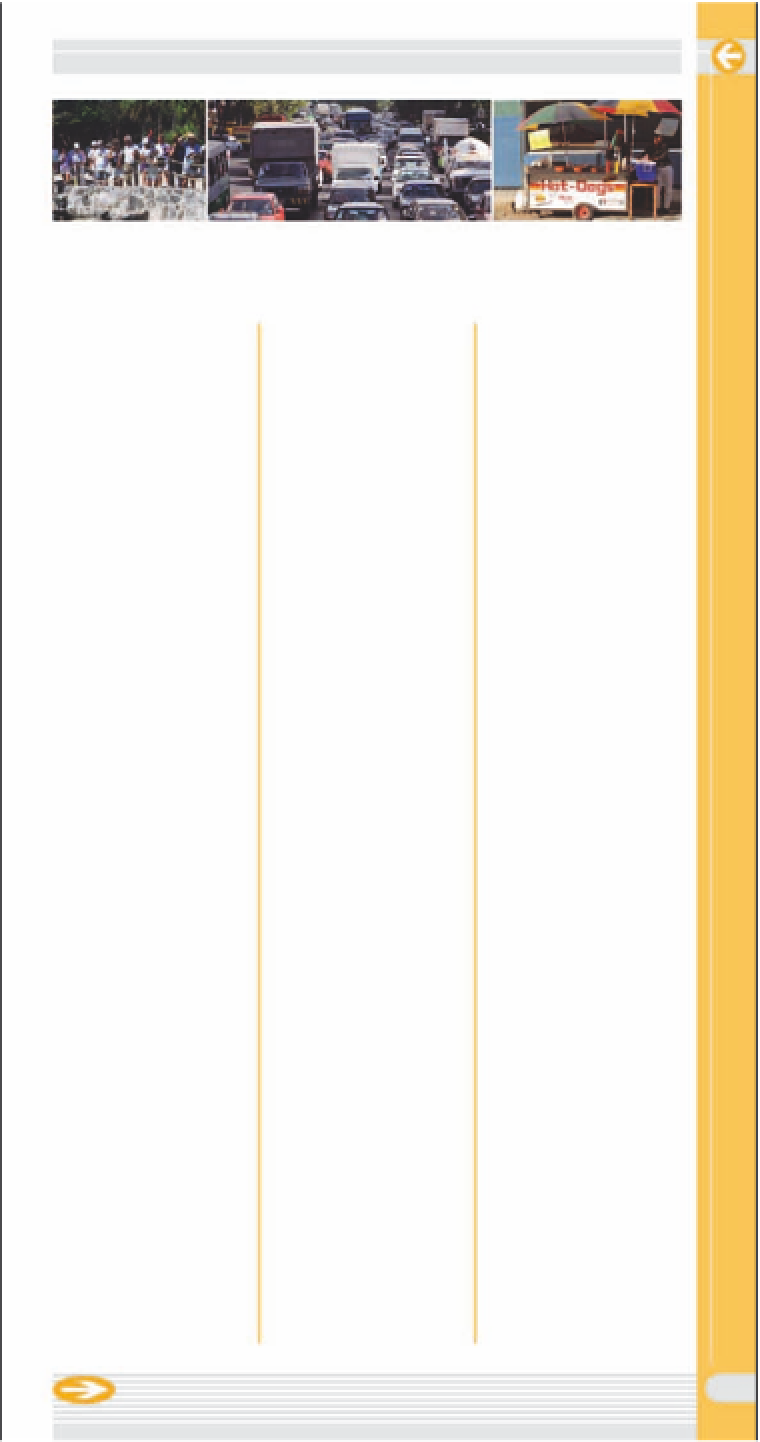Travel Reference
In-Depth Information
Left
Tourists wearing hats in the sun
Center
Traffic snarls
Right
Street food stall
Things to Avoid
!
Driving in Mexico
%
Turista
*
Pollution
City
Avoid driving anywhere in
greater Mexico City
during rush hours. Also,
never leave any of your
valuables in a parked car.
@
Street Crime
Some travelers take a
few days to adjust to the
local foods and may get
turista
. Nausea, diarrhea,
stomach cramps, and a
light fever are the
symptoms. If it occurs,
drink plenty of bottled
water, and eat bland, well-
cooked food for a while.
Symptoms should
disappear within a few
days. But if not, consult a
doctor. In the initial days
after arriving in Mexico
City it helps to eat
moderately and avoid
highly spiced and
unfamiliar foods.
Air pollution can pose
a health risk in Mexico
City, especially for the
elderly, young children,
and people with heart or
respiratory problems. The
city is located in a large
valley surrounded by high
mountains with thermal
inversions, which often
trap pollutants. Smoking
is prohibited in indoor
public places, but there
are some exceptions.
Fines are steep so check
before lighting up.
(
Watch Your Step
Pickpockets and purse
or camera snatching are
the most common threats
and can occur anywhere.
Avoid wearing expensive
jewelry and leave your
valuables in a hotel safe.
Stick to the main tourist
streets when walking, and
avoid walking at night.
Use hotel or
sitio
taxis for
evening transportation.
£
Street Taxi
Mexico City was built
on an old lake bed, and
everywhere you go you
will see buildings that
have sunk below street
level, and many that are
tilting as well. The city
has also experienced
severe earthquakes,
which have left uneven
streets and sidewalks in
many places. Watch your
step while you walk.
^
Sunburn and
Dehydration
The sun is intense in the
high altitudes of Mexico
City, and it is a good idea
to apply sunscreen and
wear a broad brimmed
sunhat for protection.
Wear sunglasses for your
eyes. Dehydration is a
common problem, and it
is important to carry
bottled water with you
and drink liquids regularly.
&
Altitude Sickness
Never use a street
taxi for transportation.
Rather use hotel or
sitio
taxis. A high proportion
of violent crimes against
tourists results from
using roving taxis.
$
Food and Water
The tap water in
Mexico City should not
be consumed. Some of
the high-quality hotels
have their own water-
filtration systems. Many
higher-priced restaurants
use filtered or bottled
water. In casual or lower-
priced restaurants only
drink bottled beverages
without ice. Avoid street
food in general, but in
particular food that is not
freshly cooked and
served hot, or that uses
uncooked greens such as
lettuce and cilantro
(coriander).
)
Weather and
Temperature
Changes
Most tourists will notice
minor weather changes,
with cool mornings and
nights that require a
jacket. Rain storms can
occur in the afternoon at
any time of the year, and
an umbrella or rain jacket
will be useful. In winters
make sure either your
hotel is heated or that it
provides extra blankets. In
summers you will want
either an air conditioned
room or a good fan.
Mexico City is at
7,350 ft (2,240 m) above
sea level, and if you are
arriving from a much
lower altitude, you should
allow a few days before
engaging in strenuous
activity. If you have
symptoms such as
headaches or shortness
of breath, it helps to drink
plenty of water and be
moderate in the use of
coffee, tea, and alcohol.
Rush hour in Mexico City is from about 8-10am and 3-7pm on
weekdays
105


































